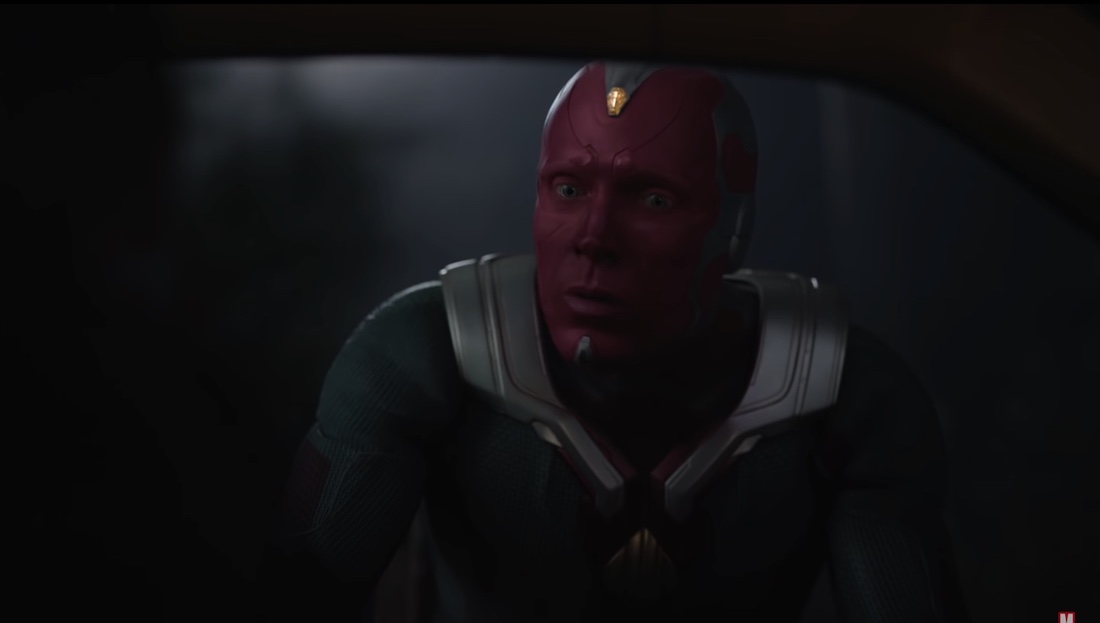In its first show for the Disney+ streaming service, comic giant Marvel explores in the hit series Wandavision a depth of storytelling that reaches beyond the stereotypical good-versus-evil battle of so many superhero tales. It explores the inseparability of human creativity and the condition of our hearts.
The final episode was released on March 5. This post contains spoilers.
Wandavision features the Scarlet Witch, Wanda Maximoff (Elizabeth Olsen), and the Vision (Paul Bettany), two secondary (though not anymore, I hope) heroes from the Marvel cinematic universe, previously seen in the blockbuster films Avengers: Age of Ultron, Captain America: Civil War, Avengers: Infinity War, and Avengers: Endgame.
Instead of fighting crime, however, the series begins with the superpowered duo starring in a 1950s sitcom, reminiscent of classics of the era like I Love Lucy. Then, it shifts in the next episode to the 1960s, continuing a decidedly Bewitched dynamic between the Scarlet Witch and her android husband, and so on through the decades. Along the way, the question of how they got there and who’s beyond it creeps closer and closer into view. A stream of phildickean/Truman Show-esque glitches – a voice from the radio asking if Wanda is all right, a macabre beekeeper emerging from the sewer (only to be magically rewound by Wanda, as if someone pressed rewind on a VHS video recorder) – suggest something insidious may be afoot. But what?
It turns out there is a villain, Agatha Harkness (Kathryn Hahn), but she didn’t create the faux TV-Land reality of Westview, the small-town suburb in which Wanda and the Vision have covertly made their home. Rather, as Agatha later reveals, it was the world of Wandavision that attracted her to Westview. She came to find the source of its magic.
Meanwhile, it comes to light that many seemingly suspicious happenings are just the good guys on the outside trying to reach Wanda: The voice on the radio is FBI Agent Jimmy Woo (Randall Park) trying to help. The beekeeper is a S.W.O.R.D. agent in full hazmat gear who, upon entering Westview, transformed to fit the aesthetic of that episode’s era. When S.W.O.R.D. Agent Monica Rambeau (Teyonah Parris) successfully infiltrates the show only to be dramatically “written out” after confronting Maximoff about the death of her brother, Pietro, she unveils the mystery at the heart of the show: “It’s all Wanda,” she says.
Not only had Wanda lost her brother, but she later lost the person who proved the surest comfort throughout her grief: the Vision himself. When pressed to relive her repressed memories by Agatha, we learn that sitcoms served as a recurring solace throughout Wanda’s traumatic life. Then Wanda steps into a moment where Vision offered her words of comfort foundational for understanding the drama of the show: “What is grief but love persevering?”
Unable to even claim the Vision’s body for a proper burial after his death (as an android, S.W.O.R.D. regarded him as government property and a superweapon for their study/use), Wanda wanders to a plot of land in Westview that Vision obtained for them. Finding only an abandoned foundation of a house sitting among the shrubbery, she collapses to her knees. Her grief and her magic combine, spilling out of her to create a false reality composed for her consolation – a magic that unintentionally takes control of the town’s inhabitants and forces them against their wills into roles in Wanda’s sitcom fantasy.
A quote attributed to the Russian Orthodox saint Seraphim of Sarov can help Christians see Wandavision through the light of faith: “Acquire the Spirit of peace, and thousands around you will be saved.” Marvel’s new show explores a negative corollary: without the Spirit of peace, thousands around you may be damned. As Christ warned the religious authorities of his day: “For out of the abundance of the heart the mouth speaks. A good man out of the good treasure of his heart brings forth good things, and an evil man out of the evil treasure brings forth evil things” (St. Matthew 12:34-35). So also, out of broken hearts we tend to spread brokenness in our world.
None of us (to my knowledge) have superpowers like Wanda or the Vision, but we can see in our lives how our pain and brokenness feed into our creative work, whether in our jobs, families, hobbies, or other vocations. There is something to the thought of the Social Gospel figure Washington Gladden that the command to “love your neighbor as yourself” (Leviticus 19:18) implies and requires a certain level of self-care.
God created us to “have dominion” (Genesis 1:26) over the earth and its resources, to “till the ground” (2:5) and be “a helper” (2:18) to one another, as icons of God in the world He created. Yet, as I wrote in my book:
We have inherited a world of heartbreak. Time has been transformed from a process of growth to one of decay. Not only do we die, but our hopes, dreams, friends, marriages, communities, concepts, ideas, experiences, and feelings are all mortal too. As we pass from one moment to the next, we are, in a sense, continually dying.
And death is a problem that even Wanda admits her magic cannot overcome. Indeed, it is easy to get caught up on all the measurable data that go into our public policies – data that, while useful, can overshadow far more important, intangible, and non-quantifiable realities that mere human effort (super or otherwise) continually proves insufficient to handle.
From a Christian point of view, Wandavision should be a reminder to “seek first the kingdom of God and His righteousness” (St. Matthew 6:33), a life characterized by each day reorienting one’s vision to the resurrection of Jesus Christ, acquiring the Spirit of peace anew, and rising up to walk the way of life, not only for the kingdom of God but also, albeit secondarily, for the common good.

